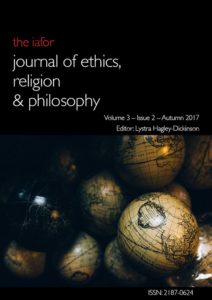IAFOR Journal of Ethics, Religion & Philosophy: Volume 3 – Issue 2
Editor: Lystra Hagley-Dickinson, Plymouth Marjon University, Plymouth, UK
Published: October 14, 2017
ISSN: 2187-0624
https://doi.org/10.22492/ijerp.3.2
Editor’s Introduction
 This is the fourth issue of the IAFOR Journal of Ethics, Religion & Philosophy. The subject matter of such a journal is as broad as it is varied. A journal of this nature is quite the challenge when choosing a selection of articles that in their interplay might provide a forum for its themes, and to be the fundamental pillars to justice and knowledge in how they are derived, perceived and expressed. As the new editor to this journal, this was my task.
This is the fourth issue of the IAFOR Journal of Ethics, Religion & Philosophy. The subject matter of such a journal is as broad as it is varied. A journal of this nature is quite the challenge when choosing a selection of articles that in their interplay might provide a forum for its themes, and to be the fundamental pillars to justice and knowledge in how they are derived, perceived and expressed. As the new editor to this journal, this was my task.
The seven articles are drawn from seven different countries: India, Uganda, Nigeria, Caribbean, Australia, Spain and Japan, and they continue with IAFOR’s focus of proving a platform for cross nationality and intersectionality in the dispersal of knowledge. They are multidisciplinary focussed with each author reflecting on the implementation and applicability of ethics, religion and philosophy, through an eclectic choice of topics. The primary theme of this issue is therefore about justice.
Piyali Mitra discusses the “Halakhalic” standing concerning of the use of the human embryonic cell for research and employs the ethical issues arising from the use of technologies and medical advances made in human reproduction, from an abstract philosophical perspective instead of just Jewish traditional thoughts. Wilfred Lajul advocates that “true justice” is more than punishments for the wrongs done; it involves healing the wounds of conflict, mending broken hearts, reviving dampened spirits and restoring relations torn apart by human violence and involves a role for religious leaders. Sule Peter Echewija refutes the justice of court rulings which profess justice but whose processes merely enable and perpetuates injustice using the example of plea-bargaining.
As new Journal Editor, I felt compelled to contribute on how we should practically implement ethics. Indeed, in the past I have been forced to provide methodology on ethics to my student social workers while teaching in the Caribbean and it seemed like the missing strand in this collection. In terms of methodology, my offering is a feminist’s standpoint to doing ethics and justice. A.C Ping utilising the example of international and organised crime wants, through his empirical research, to demonstrate that unethical outcomes can, if unchecked, be perceived to be just. Burabari Sunday Deezia provides a theoretical examination of the meaning and forms of asceticism as a central position in different religious traditions; be they African Traditional religion, Christianity, Islam, Hinduism and Buddhism. He establishes that the practice of asceticism needs to be obligational for it to be influential to justice, a point with which many may disagree. We end on a rather tautological note with Israel Salas Llanas, who constructs an argument around the dual self as a brain process or cultural exaptation. According to Salas Llanas, in our development of knowledge of self, we give up self-unity for science which is objective/subjective dualism and that this dualism creates a self-awareness that then alienates us from our reality and hence we are in a perpetual journey to a fictitious end.
If I was to extrapolate in the language of justice as a value judgment to life, this exploration of justice is but a myth in an attempt to recover our lost unity, and before we can do justice we need to find it in ourselves.
Best regards,
Lystra Hagley-Dickinson
Editor
IAFOR Journal of Ethics, Religion & Philosophy

